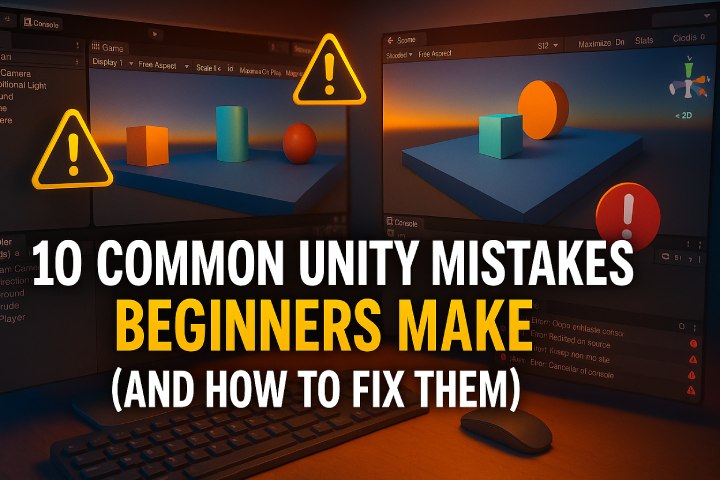Unity is one of the most popular game engines for beginners and professionals alike. However, new developers often fall into common traps that can slow progress or cause frustration. Here are 10 frequent Unity mistakes beginners make—and how to fix them.
1. Not Using Prefabs Properly
Beginners often duplicate objects instead of using prefabs. This makes updates harder. Fix: Use prefabs for reusable objects; any changes to the prefab update all instances automatically.
2. Ignoring Scene Organization
A messy hierarchy slows development and debugging. Fix: Name your objects clearly, use empty parent objects, and organize assets into folders.
3. Overusing Update()
Placing too much code in Update() can hurt performance. Fix: Use events, coroutines, or FixedUpdate() where appropriate.
4. Not Understanding Rigidbody and Physics
Incorrect Rigidbody settings can lead to unrealistic movement or collisions. Fix: Learn the difference between Kinematic and dynamic Rigidbodies, and adjust drag and mass correctly.
5. Forgetting to Optimize Textures and Models
High-resolution assets can cause lag, especially on mobile. Fix: Compress textures, reduce polygon counts, and use LOD (Level of Detail) for models.
6. Poor Lighting Setup
Relying only on default lighting can make scenes look flat. Fix: Use baked and real-time lighting appropriately, adjust light intensity, and use light probes for dynamic objects.
7. Ignoring Script Errors
Beginner developers sometimes ignore console warnings or errors, causing bigger problems later. Fix: Fix errors immediately and read warnings carefully—they often prevent crashes.
8. Hardcoding Values in Scripts
Hardcoding numbers makes projects inflexible. Fix: Use public variables, ScriptableObjects, or configuration files to make adjustments easier.
9. Not Using Version Control
Skipping Git or other version control systems can lead to lost progress. Fix: Use Git or Unity Collaborate to track changes and collaborate with others safely.
10. Overcomplicating Projects Too Soon
Beginners may try to implement advanced mechanics without mastering basics. Fix: Start small, complete simple projects, and gradually add complexity.
Conclusion
Avoiding these common mistakes can save time and frustration. Unity is powerful, but like any tool, mastering it requires patience, practice, and learning from mistakes. By following these tips, beginners can build better games more efficiently and enjoy the development process.


Comments (0)